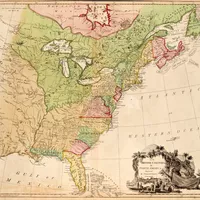CHAPTER X. 'NUNC DIMITTIS' 1796-1808
Our tale is told.
The Active was wrecked on the island of Anticosti, where the estuary of the St Lawrence joins the Gulf. No lives were lost, and the Carletons reached Perce in Gaspe quite safely in a little coasting vessel. Then a ship came round from Halifax and sailed the family over to England at the end of September, just thirty years after Carleton had come out to Canada to take up a burden of oversea governance such as no other viceroy, in any part of the world-encircling British Empire, has ever borne so long. He lived to become a wonderful link with the past.
When he died at home in England he was in the sixty-seventh year of his connection with the Army and in the eighty-fifth of his age. More than any other man of note he brought the days of Marlborough into touch with those of Wellington, though a century lay between. At the time he received his first commission most of the senior officers were old Marlburians. At the time of his death Nelson had already won Trafalgar, Napoleon had already been emperor of the French for nearly three years, and Wellington had already begun the great Peninsular campaigns. Carleton's own life thus constitutes a most remarkable link between two very different eras of Imperial history. But he and his wife together constitute a still more remarkable link between two eras of Canadian history which are still farther apart. At first sight it seems almost impossible that he, who was the trusted friend o Wolfe, and she, who learned deportment at Versailles in the reign of Louis Quinze, should together make up a living link between 1690, when Frontenac saved Quebec from the American Colonials under Phips, and 1867, when the new Dominion was proclaimed there. But it is true. Carleton, born in the first quarter of the eighteenth century, knew several old men who had served at the Battle of the Boyne, which was fought three months before Frontenac sent his defiance to Phips 'from the mouth of my cannon.' Carleton's wife, living far on into the second quarter of the nineteenth century, knew several rising young men who saw the Dominion of Canada well started on its great career. All Carleton's sons went into the Army and all died on active service.
The fourth was killed in 1814 at Bergen-op-Zoom carrying the same sword that Carleton himself had used there sixty-seven years before. A picture of the first siege of Bergen-op-Zoom hangs in the dining-room of the family seat at Greywell Hill to remind successive generations of their martial ancestors. But no Carleton needs to be reminded of a man's first duty at the call to arms. The present holder of the Dorchester estates and title is a woman. But her son and heir went straight to the front with the cavalry of the first British army corps to take the field in Belgium during the Great World War of 1914. Carleton spent most of his last twelve years at Kempshot near Basingstoke because he kept his stud there and horses were his chief delight.
But he died at Stubbings, his place near Maidenhead beside the silver Thames, on the 10th of November 1808. Thus, after an unadventurous youth and early manhood, he spent his long maturity steering the ship of state through troublous seas abroad; then passed life's evening in the quiet haven of his home.

